The views expressed in our content reflect individual perspectives and do not represent the authoritative views of the Baha'i Faith.
Imagine yourself, for a moment, as a fish in a river. The river, your world and your sustainer, supplies all of your needs, and nourishes and shapes your interactions in it. The river is religion – any religion.
To be sure, other fish live in lakes and ponds outside of the river religion, and the rain of God’s grace sustains them too, but the lakes and the ponds and their fish are not connected to any forward-moving religious cause and the experience of the power of the Holy Spirit – the current – does not flow strongly through them to any spiritual end.
Seeing religion as a river can help us understand the changing reality we exist in, our experience of it, its life-giving function, and its goal. The Baha’i writings use this same analogy, when Abdu’l-Baha in his book The Secret of Divine Civilization called religion the “fathomless river of the waters of life that flows through the teachings of the Holy Books …”
RELATED: The Baha’i Fast: A River of Life-Giving Waters

The character of a river at any particular place in its course depends largely on the terrain. In some places rivers flow smoothly and peacefully, but in others the river hits the rocks of opposition and the going gets rough. There have been times when religious people have had to fight for survival, as did the Jews in Canaan and the early Muslims when opposed by the clan of the Quraysh.
Religious rivers also become violent when confronted with intolerable practices and injustice. If an invisible God exists, a great sustaining Organizer who wants to be known, it’s hard to imagine any affront as blatant and ignorant as worshipping idols of clay, stone or gold. Hence, destruction of barriers to social and intellectual progress has also been allowed in religion. So too have attacks on injustice. We have only to recall the major theme of the Bhagavad Gita as the necessity to take action against injustice. Even generally peaceful Buddhism has an intolerance for injustice that can occasionally manifest itself violently among some of its adherents.
At other times the rivers of religion run strong and fairly true, as during the times of David and Solomon, or when Christianity peacefully expanded its community of churches throughout the Roman Empire, or when Islam benefitted Andalusia and the Middle East around the first millennium, or when Hinduism reached a zenith during the Mauryan Empire, or when Buddhism benevolently ruled Gupta India and Tang China. In these times no obstacle can stop the power of the river, and it brings many blessings to people near and far.
We have caused the rivers of Divine utterance to proceed out of Our throne, that the tender herbs of wisdom and understanding may spring forth from the soil of your hearts. Will ye not be thankful? – Baha’u’llah, Gleanings from the Writings of Baha’u’llah, p. 43.
As rivers grow, they acquire socially useful purposes. They irrigate land, provide transportation, furnish water and generate electricity. All of this goes more or less unnoticed by the river’s fish, and yet rivers influence many things beyond the river. So too do religious rivers. The functioning of society, our codes of behavior, our manner of interaction, and the goals we adopt are all shaped by rivers of religious thought, whether or not we swim in that river.

At other times, a river may pick up and change course, dry up, go underground or even run off cliffs. Religious rivers do too. Religious teachings can be re-interpreted, adjusted, ignored, or forgotten. They can also be polluted or poisoned by members of the religion or by others.
Consider now the lives of the fish in the river. Being a fish in a religious river captures the joy of religious experience. Swimming in the rivers of religious experience can be exhilarating. In those soft-flowing rivers, it feels right and good to worship God (or Allah), to praise Jesus, to contemplate Buddha-nature, and to dance like the gopis with Krishna.
The fish – the believers – at any particular place in the river of religion can, however, be quite different from the fish at other places. The river of any religion contains many, many different congregations of believers along its length. Each congregation feeds, as it were, on the food (scripture) presented to them locally, often by fish-feeders (clergy). As scripture is vast, clergy (the fish feeders) can chose from an almost limitless supply of scriptural food and interpretations. As the understanding of both fish-feeders and fish is limited, vast differences arise in the beliefs of congregations of fish (believers).
RELATED: Why Should We Care About Nature?
Rivers can also be partially diverted to form fish farms (mega churches, temples and mosques) where food is predigested and parceled out in carefully controlled feedings to support particular views. Independently-minded fish, of course, can choose to not accept such a limited diet and either not enter the farm or choose to leave if the food offered – often a return to fundamentalism or increasing condemnation of others – has become insufficient or indigestible.
Rivers also have an end. Here, it gets interesting – because religions, like rivers, have a common endpoint. With rivers it is the sea; with religions it is their victory or consummation marked by the coming together of all people to worship and to build together a new and better world. This is where we are now, but most don’t know it. Humanity has come together like rivers to the sea. We have reached our long-promised destination – but many seem blind to it. We are here, but we have not yet learned the ways of behavior that fit our times.
As the Baha’i teachings promise, however, we are destined to learn those new ways and ultimately unite the entire human race. Just as all rivers ultimately flow into a single ocean, humanity and our religions will become one:
The rivers of divine wisdom and utterance which flowed through the Tablets of God are joined to this Most Great Ocean, could ye but perceive it, and whatever hath been set forth in His Books hath attained its final consummation in this most exalted Word — a Word shining above the horizon of the Will of the All-Glorious in this Revelation which hath filled with delight all things seen and unseen. – Baha’u’llah, The Summons of the Lord of Hosts.
[Note: Because of a publishing error, this article was not included in its series in the correct order. We have now corrected the numbering so those who wish to read the entire series in sequence can do so. BahaiTeachings.org apologizes for the error.]
You May Also Like
Comments

















symbolic elements flowed so well, which may prove again that everything in this world is a reflection of the next one.